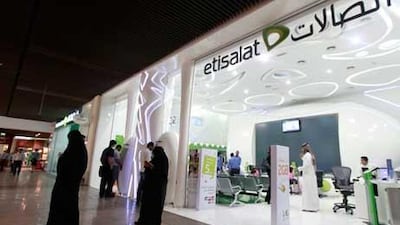DUBAI// Du and Etisalat have reassured customers that their new superfast 4G networks will not interfere with GPS and television signals.
It comes after reports in the United States and UK that the new technology can potentially affect other electrical devices.
However, both telecoms companies say users in the UAE will be unaffected because their networks use a different part of the frequency Long Term Evolution (LTE) spectrum.
"The issue of interference created by TV and GPS is not existing in UAE, since the LTE band used by Etisalat is 2600MHz or 1800MHz which are neither used by TV nor GPS systems," said a statement from Etisalat.
"In other countries there are interference due to use of lower frequency band for LTE like 700MHz or 800MHz."
Etisalat began rolling out its 4G network towards the end of last year promising broadband speeds of 100 megabits per second.
In the UK up to 2 million people watching television on the Freeview free-to-air service are likely to have interference problems.
As a contingency some of the households affected will have filters fitted, although viewers in the worst affected areas will be forced to switch to cable or satellite.
Du began deploying its network in June and is utilising the 18000MHz frequency.
The company said television broadcast services used the 470MHz to 800MHz range of the spectrum.
"The UK interference situation being referred to is a result of 4G (LTE) deployment in the so called Digital Dividend 800MHz band (namely 790MHz-862MHz) which is being auctioned in the UK now," said a statement from Du.
"Currently, Ultra-High Frequency (UHF) television broadcasting utilizes the band range from 470MHz - 800MHz.
"To deploy 4G LTE mobile services in the 800MHz band range, the 790MHz-862MHz frequency needs to be vacated for mobile usage.
"This requires all analog television broadcasters to move to lower bands by switching to digital terrestrial television."
The company says the Telecommunications Regulatory Authority (TRA) had issued the Terrestrial Digital TV Switch Over Plan in 2009 ordering broadcasters to vacate the 790MHz to 862MHz frequency to free it up for mobile services.
Terrestrial TV transmitters will be switched off by December of this year, said Du.
Matthew Reed, an analyst for Informa Telecoms and Media in Dubai agreed saying TV viewers and GPS users in the country had no reason to fear interference.
"In the US, there was a clash last year between Lightsquared, which was rolling LTE, and the GPS industry, which said the Lightsquared network was interfering with GPS services," he said.
"Lightsquared was using spectrum in the 1500MHz band that was adjacent to the band used for GPS.
"The FCC [Federal Communications Commission] ruled against Lightsquared, which subsequently went bankrupt."
nhanif@thenational.ae

